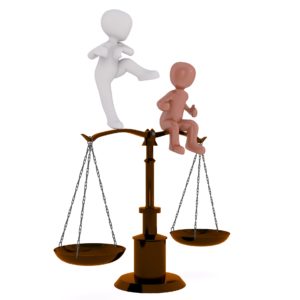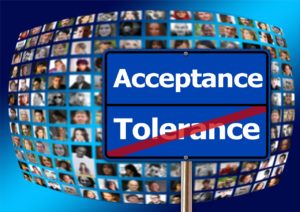 Because we believe in secularism, “believers” and “non-believers” are unable to meet on equal terms. The result is that “believers” acquiesce to the political arguments of “non-believers” whose positions seem clearly secular. However, we shall see that secularism is founded on flawed semantics and has not only become unsustainable but the source of religious bigotry.
Because we believe in secularism, “believers” and “non-believers” are unable to meet on equal terms. The result is that “believers” acquiesce to the political arguments of “non-believers” whose positions seem clearly secular. However, we shall see that secularism is founded on flawed semantics and has not only become unsustainable but the source of religious bigotry.
Like Newton’s laws, secularism has been quite useful, but it has run its course. It cured our early ills of religious intolerance but its continued, vigorous application has become the vehicle of a more insidious narrow-mindedness. Insidious because it’s roots have been hidden in that space between words and their meanings. With our nation growing a deep chasm between opposing political camps, it is clear that the separation called for by secularism is failing us.
Secularism has been pursued for over two centuries, and virtually every citizen believes in it. But the words we use in applying these time-honored concepts have hidden the reality that now divides us. We have constructed a false dichotomy between “believer” and “non-believer”, between “religious” and “irreligious” and thus between church and state. But that paradigm isn’t working and there are clear reasons for its failure.
Let’s take a look at the underpinnings of all this.
Anciently, the State Was Ruled by Religion
For thousands of years, religious authority and civil authority were typically vested in the same people. When our colonies began to form the union, there were some difficult moments while secularism was pushed to the fore.
So the idea of separation of church and state is relatively new in our history, and we should not be surprised if we have yet to discover better ways of making this desired separation work. Many of us think we have arrived, but we are in a phase that is destined to morph into a new and better way. The reason we aren’t making progress anymore, is because —
We Are Still Ruled by Religions
— and always will be. And that’s the whole point.
The fact is, our political conflicts stem from our diverse religious beliefs that are not only different, but in many ways opposite. That’s because everyone is religious in the broad sense of that word. Here’s the proof of that and the basis of a new and better paradigm.
See if you can agree with this: it is a fact that every human being is forced to make choices about what is good and what is not. Further, such choices are based on one’s worldview, one’s idea of the nature of the world and/or the people in it. Let’s take an historic angle on this as an example.
If you believe there is a higher intelligence that organized or created our world(s) and us, and that we ought to realize that we are responsible for our actions because we may eventually have to give an accounting for them, then you have a typical religious attitude about these things and your selections of “good” will be a reflection of those beliefs. If, on the other hand, you reject that idea, then your choices of what is good will be different. Frequently, they will not be entirely different, but there will be noticeable differences in the opinions of what is good and what is not. Abortion, euthanasia, gender identification, and marriage contracts are examples.
“Non-believer” is an oxymoron
So the point is that both “believer” and “non-believer” are religious in the broad sense of that word because they each have their own way of seeing the world, a way of believing what is good and what is not. The fact that neither of these two can prove that their opinion is the most accurate description of our universe, or even the wisest opinion; that fact makes them both believers and religious — again, in the broad sense of those words. The common meaning of “non-believer” is that the person does not believe in deity, and that meaning is a good one. But unless we look a bit deeper, we miss that fact that he is nonetheless religious.
Now let’s not get into a semantic tizzy here and get lost in the space between words and their meanings. Every human being lives within the belief system that he has adopted. That is his world view, and we are therefore all believers in that very real sense. We look at life through the glasses we chose to wear and we all wear them.
So we have fallen into a semantic trap of thinking that the superficial division between believers and non-believers (and by inference between religious and non-religious) goes all the way to the bottom. It doesn’t. There is a more fundamental layer of belief where our individual worldviews live. At that level we are all equals: forced by our very nature to adopt some way to look at the issues of life. This is where we can find equality, harmony and eventually unity.
Thus secularism has failed and cannot succeed at what it’s supposed to accomplish. However, it has succeeded in stripping out religious dogma and specific references to deity from our laws, and that is a good thing. On the other hand, it has not removed religious bias, religious behavioral standards, or religious values from our laws. Instead it has sanitized the law and stripped off the religious coatings so that we think secularism has succeeded. Meanwhile we suffer with the consequences of the illusion. New laws control our speech, our places of worship, and where we can display our religious symbols. This is not the protection of minorities for which we are famous, nor for which our people die on foreign battlefields. That, in spite of the fact that believers in deity are not a minority.
The US Supreme Court has recognized that no religion can be given priority. The idea that we have a right of conscience proves that we must equally honor all persuasions. In Minersville School District v. Gobitis, Justice Frankfurter stated, “The right to freedom of religious belief, however dissident and however obnoxious to the cherished beliefs of others — even of a majority — is itself the denial of an absolute.”
One Common Attitude Proves We Recognize This
There are many examples we could cite to prove that the general population agrees that religious and nonreligious people are both religious in this most fundamental sense. In the laws pertaining to adoption there is often a reference to placing a child in an environment that will not disrupt any prior religious training or practice. We all agree that this policy should be followed whether the environment was, in common parlance, religious or irreligious. The child should be placed in the same religious setting, whether that was believers or nonbelievers.
This shows that our common sense puts believers and nonbelievers on an equal footing in the context of adoption. Atheism, for example, is recognized as a religion. We need to establish this equal footing across all policies and legislation. That would answer the first amendment’s prohibition of establishing any particular persuasion.
Separation is Impossible
 Since we are all believers in our chosen world views, we are all the same. That realization should help us recognize that we are all on the same rung of the ladder of understanding and need to honor and respect one another’s choices.
Since we are all believers in our chosen world views, we are all the same. That realization should help us recognize that we are all on the same rung of the ladder of understanding and need to honor and respect one another’s choices.
But it goes beyond that and this is what makes separation impossible. Laws are written with a goal in mind to promote some “good”. Hence, laws are based on someone’s judgement of “goodness” which comes from his worldview, philosophy or religion. So each law arises because of someone’s religion. The conclusion is unavoidable: all our laws are based on some religious value. Complete secularism in our legal structure is therefore impossible. And hence separation of church and state is impossible because eery law and every court ruling is based upon a “good” derived from a worldview, in other words from a religious basis.
And the Attempt is Divisive
Because we believe in this false dichotomy between church and state, we blindly vote to empower the candidate who seems to hold the world view closest to our own instead of voting for freedom. It has become a power struggle rather than an assertion of freedom. In other words, we vote to impose our favorite religion upon the country by getting our favorite legislation passed. Our political zeal is actually religious zeal. In fact, it is that zeal that first put me on this trail to discover why the separation of church and state is so problematic. Our religions have created opposing classes in a nation that was, and is, destined to be classless.
And the Attempt is Destructive
Because we have all believed in the separation concept, “believers” have assented to the reasoning of “non-believers” whose explanations seemed clearly secular. The majority rule concept of our democratic republic has been shunted off to the side as the “believers” lost their voice, their influence, and their confidence. This is a grave matter of great concern to every citizen whose desire is for happiness and peace, for as the divide deepens and animosity creeps in, verbal conflict turns more and more toward physical conflict.
Our Next Phase is the Accommodation of Freedom
 The separation concept is based on exclusion, of drawing boundaries and sectioning off ideas. That conceptual division naturally extends its influence onto physical lines that are showing up everywhere. [click_to_tweet tweet=”Secularism is sterilizing the public square into oblivion: no monument, no art form, no conversation, and not even architecture is safe. We need to trade in separation of church and state for the new freedom paradigm. https://tinyurl.com/yaxbjqm9″ quote=”The public square is being sterilized into an oblivion where no statue, no art form, no conversation, and not even architecture is safe.”]
The separation concept is based on exclusion, of drawing boundaries and sectioning off ideas. That conceptual division naturally extends its influence onto physical lines that are showing up everywhere. [click_to_tweet tweet=”Secularism is sterilizing the public square into oblivion: no monument, no art form, no conversation, and not even architecture is safe. We need to trade in separation of church and state for the new freedom paradigm. https://tinyurl.com/yaxbjqm9″ quote=”The public square is being sterilized into an oblivion where no statue, no art form, no conversation, and not even architecture is safe.”]
Accommodation is inclusive and its essence is freedom of thought and action: the idea of including everyone (and their trappings) as equals. That stems from the fact that we are each the pawn of our own world view. We are all believers in what we believe in. It’s so simple we look right past it.
This is the freedom alternative — to pursue freedom instead of power and its restrictions: to seek accommodation, tolerance and a true celebration of diversity instead of trying to impose our world view on the nation.
Accommodation was George Washington’s approach to church and state issues. He developed this paradigm while dealing with the many religions of recruits sent to his command while serving in the military. And hestayed with it throughout his public service. It remained the common understanding of entire nation for more than a century, but was gradually replaced by the simplistic idea of a wall of separation — exclusion.
Pinching Off Conflict
A pincer movement can stop conflict and leave accommodation empowered. The one arm of the pincer is to advance an understanding that the only sustainable approach to our differences is not only complete tolerance but actual celebration of the power of diversity — that a deeper understanding and a higher truth can be discovered within opposing opinions . But that can only happen in a tolerant and respectful public square.
The other arm of the pincer is to adjust our legislation to handle issues in the lowest possible jurisdiction. For example, the question of whether prayer should be allowed in a school should be decided by the parents of the children in that school. The question of whether a christian cross should stand in the county courtyard should be decided by the citizens of that county. This kind of celebration of diversity would eventually make crossing a state line like the adventure of crossing from Germany into Spain. And citizens could choose to live where they were most comfortable.
How to Set a New Paradigm
Every talk show, for example, should set the stage for interviews by pointing out that both sides of the issue are on even ground – that each side holds its opinions based on individual beliefs — on world views. Even the idea that science is the only true basis for the discovery of truth is a belief. Science is extremely impressive but only in the realms of physics and chemistry. It still has nothing conclusive to say about morality, justice, and freedom. Except this.
Setting a new paradigm will not be an easy task. Both sides of our political spectrum are steeped in at least two centuries of belief that secularism is not only worthy but necessary. However, the popularity of the wall of separation of church and state, is only about 60 years old. Moreover, the idea that we are “equals” is a well-established and happy sounding phrase, and the realization that we each have our own, individual world view is not a difficult one. Let us move on to the higher destiny that awaits our best efforts.

How to Sell the Idea to the Non-believers
You can help non-religious people realize that we are all guided by our individual religions (world views) by simply saying, “Tell me why you believe that.” If they don’t use the word “believe” in their answer, ask again, “And why do you believe that?” Eventually they will confess their religious faith by saying something like: “Because I believe …”. Of maybe “Because I think …”. In this case, you just help a bit by saying, “So you believe …” and when they agree help them see that we all believe in what we believe.
- Protected: Because Nash Quoted Me in “Becoming Your Own Banker” - April 25, 2024
- Face it! It’s a Storm! - April 22, 2024
- An Open Letter to Tucker, Glenn, Laura, et al. - December 15, 2023





Great read. I regret to admit that I have not read all your posts. Where I concur that we all “believe” in something, it leads me to ask how a person might discern that which promotes agency from that which subjects, or how does one ensure their pathway to belief; their efforts to be informed, are leading to greater freedom and not to that which binds? Thanks for the article.
An insightful question! I have been a bit amazed at the way a focus on rights leads to understanding much. Apparently our self-agency, our will, our authority over ourselves is a profoundly basic thing. So following that thread, if one seeks out a path that leads to independence, or freedom (as opposed to enslavement) one finds ways to become empowered (having more rights?) and even more independent – able to act more, with less being acted upon. Since love is the most powerful force in our universe, it seems that seeking love (by which one may bind himself to others) and independence of action should bring one more and more knowledge and understanding. It is then interesting to notice that this is an outline of the nature of God.
Let’s pick on Utah – There really is no separation between church and state. For the most part voters vote the way they think the LDS church wants them to vote. They believe that is ‘good’. It may or may not be.
The various laws on the purchase and consumption of alcohol is a good example. Admittedly I do not drink. I follow the standards of the Church. I can and do advise people about the danger of drinking. However while I do not condone it – I do not condemn their actions. I will not propose that my ‘State’ dictate where, what kind, or how much alcohol one can purchase. Minors excepted.
One of the beliefs of the Church is “We claim the privilege of worshiping Almighty God according to the dictates of our own conscience, and allow all men the same privilege. Let them worship how, where, or what they may. ” While you and I may believe it is wrong – Why get into a fight about being able to sell only ‘light beer’?
https://www.ksl.com/article/46489179/church-opposes-sale-of-heavy-beer-in-utah-grocery-convenience-stores?fbclid=IwAR1S16KlUgSPeFSE-eXZcg_FIVJ5AKraigFCWEtdUDX7z0Tlfh6Wm46u46aqQXt8
Of course there are two perspectives on this one. Politically, the Church of Jesus Christ of Latter-day Saints has the freedom to make whatever statements it chooses. I don’t know, but suppose they just want to do what they can to minimize the consumption of alcohol because they deal constantly with the consequences of their members consuming too much. The brewers are phasing out light beer for whatever reasons they may have, so this issue came onto the table. Certainly, I would think, heavier beer means more intoxication with less consumption. That seems like a prescription for more broken homes, marriages, abuse, etc. On the other hand, the State Legislature will do whatever it does and we citizens need to speak up about our wishes in these matters.
Meanwhile I’m not sure how this is germane to the failure of secularism. 🙂